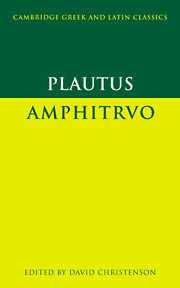Commentary
Published online by Cambridge University Press: 05 March 2013
Summary
Argumentum I
Plot summaries in iambic senarii were added to P.’s plays in (probably) the second century ad. An acrostic version survives for most plays; some have in addition a non-acrostic summary of 15 verses (the 9-line non-acrostic of Am. is unique). The argumenta consciously archaize, and usually replicate the particulars of P.’s versification. For Am., Arg. 1 is written more carefully than Arg. 11, and demonstrates deeper understanding of the play’s central themes. Acrostics were a mannerism of Hellenistic literature (cf. Virgil’s reference to his own name at G. 1.429–33, with Thomas’s (1988) note on 427–37), but their use in prophecy and the like suggests an origin in magical beliefs about the power of words.
1 faciem: the word does not occur in the play, where forma (266, 441, 456, 600, 614) and imago (121, 124, 141, 265, 458) are used in contexts describing the act of impersonation. The composer’s appreciation of uariatio can be glimpsed in 4 (cf. Arg. 17n.).
2 dum … gereret: P. would probably have used the indicative in this purely temporal clause (Lindsay 133–4).
3 Alcmenam: the spelling Alcu- is universal in the play and is in fact the transmitted reading here and in 5, but it does not scan in either place. The composer perhaps thought the penult of Alcumenam was short. uxorem cepit usurariam: a conflation of the gods’ favourite expressions, i.e. 108 usuram corporis cepit (cf. 1135–6) and 498 uxor usuraria (cf. 980–1), to describe the sexual ruse; cf. pp. 39–40.
- Type
- Chapter
- Information
- Plautus: Amphitruo , pp. 129 - 317Publisher: Cambridge University PressPrint publication year: 2000

